There’s no denying that KuCoin has long been a favourite among crypto traders, especially those with a taste for altcoin adventures and low trading fees. But while KuCoin may offer a broad selection of tokens and advanced trading features, it’s certainly not the only game in town.
In fact, as the crypto industry continues to evolve, so too does the need for flexibility. Whether it’s seeking out better security practices, lower fees, improved fiat support, or simply a smoother trading experience, more and more traders are casting their nets wider—and exploring other exchanges that may better suit their unique needs.
In this guide, we’re going to explore some of the top alternatives to KuCoin. We’ll examine how these platforms stack up across key areas like security, regulation, user experience, trading tools, and fee structures. And we’ll help you decide which exchange might be the right fit for your style of trading, whether you're a first-timer just dipping your toes in or a seasoned pro managing a diverse portfolio.
Key Takeaways
- Binance remains the most comprehensive KuCoin alternative, offering low fees, deep liquidity, advanced tools, and a vast product suite — but it comes with KYC and a steeper learning curve.
- Bybit is a top pick for futures and copy trading enthusiasts, with intuitive tools, up to 100x leverage, and strong automation — though it’s restricted in the U.S. and U.K.
- Coinbase excels in regulatory compliance, fiat support, and beginner-friendly UX, making it ideal for users prioritizing safety and simplicity over advanced trading features.
- OKX delivers a powerful CeFi–DeFi hybrid platform with low fees, pro-grade tools, and its own multichain wallet — though beginners may find the UI complex.
- Bitget targets traders interested in automation and copy trading with robust futures markets and grid tools, though its Earn section and regulation footprint are still evolving.
- Toobit is a newer but rising exchange offering up to 150x leverage, advanced order types, and the highest non-KYC limits, but lacks full fiat support and brand recognition.
- All listed platforms support spot and futures trading, offer varying degrees of copy trading and bot functionality, and maintain Proof of Reserves — either via Merkle Tree or self-audits.
Why Consider Alternatives to KuCoin
KuCoin has earned its reputation as an altcoin haven, offering access to hundreds of assets that aren’t listed elsewhere. But while its expansive token library and competitive fees have made it a hit among seasoned traders, it’s not without its trade-offs.
Over the past year, KuCoin has faced increasing scrutiny following a 2024 lawsuit from the U.S. Department of Justice, which accused the exchange of operating without proper licenses and lacking adequate anti-money laundering measures. While KuCoin has publicly reassured users that operations remain unaffected and user funds are safe, the incident has understandably shaken confidence for some.
Beyond regulatory concerns, KuCoin also has notable gaps. For instance, it still doesn’t support fiat withdrawals in many regions, customer service is widely regarded as subpar, and its KYC-free trading window officially closed in 2023. For those looking for a seamless fiat on/off-ramp, or simply better user support, KuCoin might fall short.
Moreover, as crypto traders mature, many are seeking platforms that offer tailored experiences—be it beginner-friendly interfaces, deeper liquidity, stronger DeFi integration, or features like copy trading and staking with higher yields.
In other words, exploring alternatives isn’t about jumping ship—it’s about enhancing your trading strategy. By diversifying where and how you trade, you gain access to unique platform perks, hedge against single-platform risks, and potentially unlock better tools that align more closely with your goals.
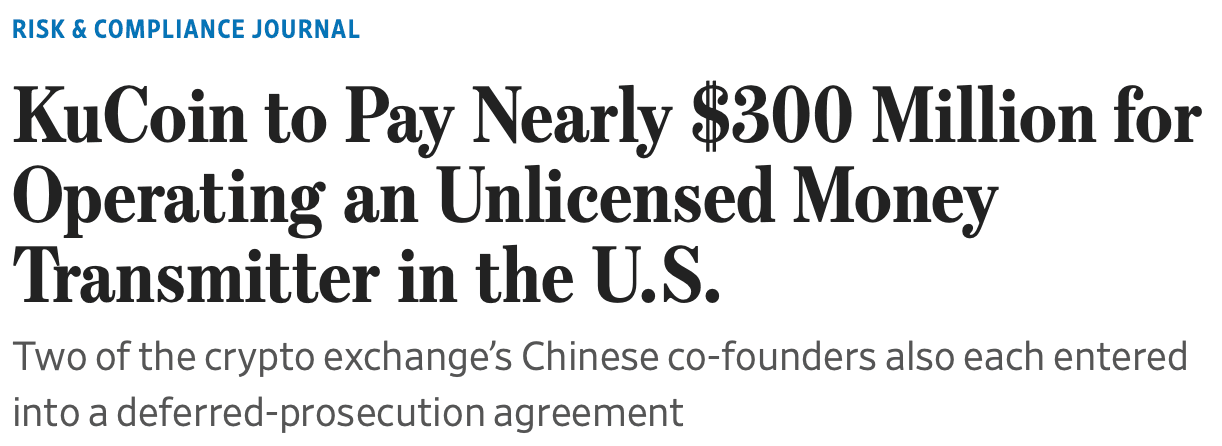 KuCoin Paid Nearly $300 Million To Settle The Case. Image via WSJ
KuCoin Paid Nearly $300 Million To Settle The Case. Image via WSJSo, whether you’re after tighter spreads, smoother fiat support, or just a more responsive support team, there’s no harm in seeing what else is out there.
Evaluation Criteria for Selecting the Best Crypto Exchanges
Before examining the KuCoin alternatives, it's essential to outline the lens through which each platform has been assessed. Choosing a cryptocurrency exchange isn’t simply about name recognition—it’s about identifying which features genuinely align with the needs of different types of traders.
Security Measures
Security remains paramount in any exchange evaluation. Key considerations include whether platforms follow industry best practices such as cold wallet storage, multi-signature protocols, two-factor authentication, and real-time threat detection. Transparency around Proof-of-Reserves and a platform’s historical response to breaches or vulnerabilities also carries significant weight.
Fee Structures
Trading fees can have a material impact on long-term profitability. Maker and taker fees across spot, futures, and margin markets were reviewed, along with any deposit or withdrawal charges. Exchanges offering incentives through native token usage or volume-based tier discounts were noted for their cost efficiency.
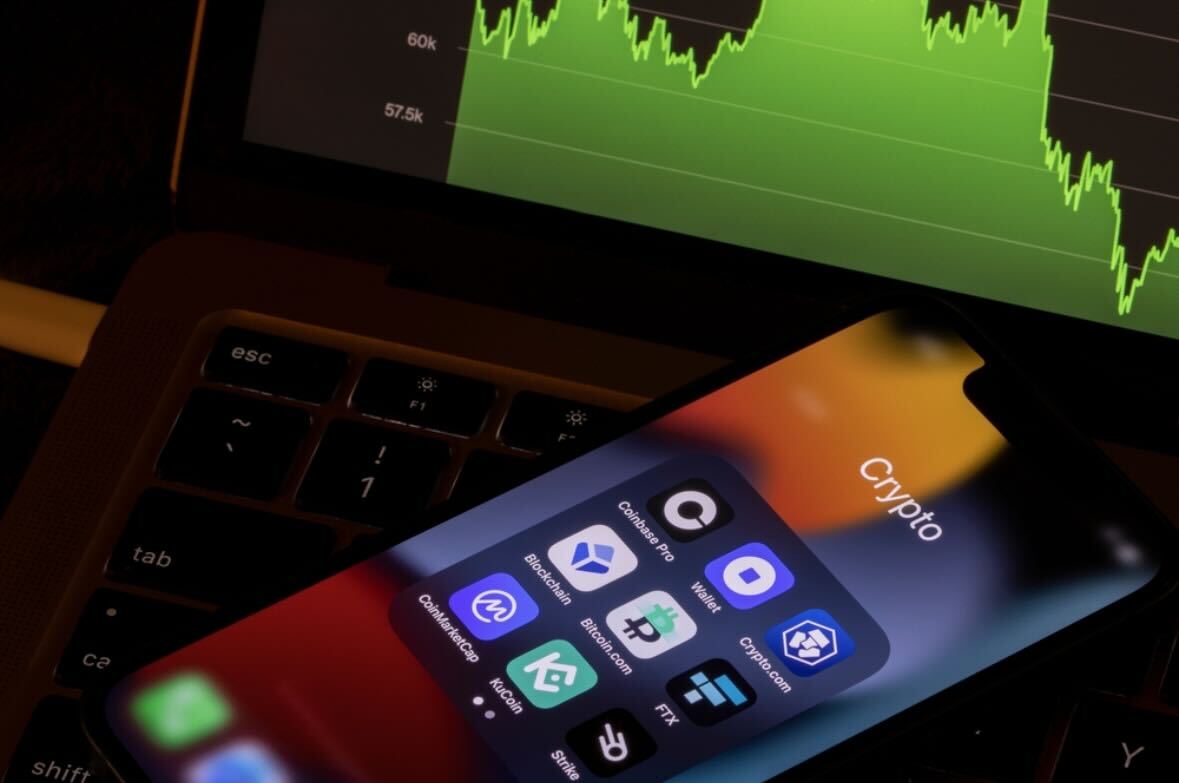 Choosing The Right Exchange Depends on Multiple Factors. Image via Shutterstock
Choosing The Right Exchange Depends on Multiple Factors. Image via ShutterstockTrading Tools and Features
The breadth and depth of trading tools can significantly influence a user’s experience. This includes the availability of advanced order types, integration with platforms like TradingView, access to margin or futures markets, and support for features such as copy trading, strategy automation, or grid trading bots. The level of sophistication offered often determines how well a platform suits different trading styles.
Regulatory Compliance
Regulatory standing is increasingly seen as a mark of credibility. Each exchange was reviewed for its licensing status within key jurisdictions and its adherence to KYC and AML protocols. Platforms demonstrating clear compliance with financial regulations tend to be more appealing to long-term investors seeking stability and risk mitigation.
Liquidity and Market Depth
Liquidity plays a critical role, especially for traders dealing in larger volumes. Evaluating average daily trading volume, bid-ask spreads, and the execution quality of large orders helps determine how efficiently trades can be completed without significant slippage.
Customer Support and User Experience
Customer service can be a deciding factor when navigating issues or learning the platform. Factors such as live chat availability, multilingual support, help centre quality, and average response time were all considered. User interface design and overall ease of navigation were also taken into account, particularly for newer entrants to the space.
Review Of The Top KuCoin Alternatives
Before diving into each exchange in detail, here's a short table summarising some of the key specifications across the platforms covered.
| Exchnage | Spot Fees (Maker/Taker) | Futures Fees (Maker/Taker) | Security Rating (CER.live) | Copy Trading | Proof of Reserves | Max Leverage | Trading Tools | Fiat Support |
|---|---|---|---|---|---|---|---|---|
| Binance | 0.1% / 0.1% | 0.02% / 0.04% | AAA | Yes | Yes, self-audited | 125x | Spot, Futures, Margin, Bots | 65+ Currencies |
| Bybit | 0.1% / 0.1% | 0.01% / 0.06% | AA | Yes | Yes, self-audited | 100x | Spot, Futures, Options, Bots | 60+ Currencies |
| Coinbase | Up to 0.4% / 0.6% | N/A | AAA | No | SEC filings, no Merkle Tree | 10x | Spot, Earn, Coinbase Advanced | USD, EUR, GBP |
| OKX | 0.08% / 0.1% | 0.02% / 0.05% | BBB | Yes | Yes, Merkle Tree | 100x | Spot, Futures, Options, Bots | 70+ Currencies |
| Bitget | 0.1% / 0.1% | 0.02% / 0.06% | AAA | Yes | Yes, Merkle Tree | 125x | Spot, Futures, Copy Trading, Bots | 40+ Currencies |
| Toobit | 0.2% / 0.2% | 0.02% / 0.06% | B | Yes | Yes, Merkle Tree | 150x | Spot, Futures, Bots | 40+ Currencies |
With that out of the way, let's dive into each individual exchange in greater detail and explore what sets them apart.
Binance
As the undisputed heavyweight champion of crypto trading, Binance has long been the go-to for millions of users worldwide. With a wide selection of assets, some of the lowest fees, and feature depth that rivals even the most sophisticated institutional platforms, it’s no surprise Binance often tops the list of KuCoin alternatives.
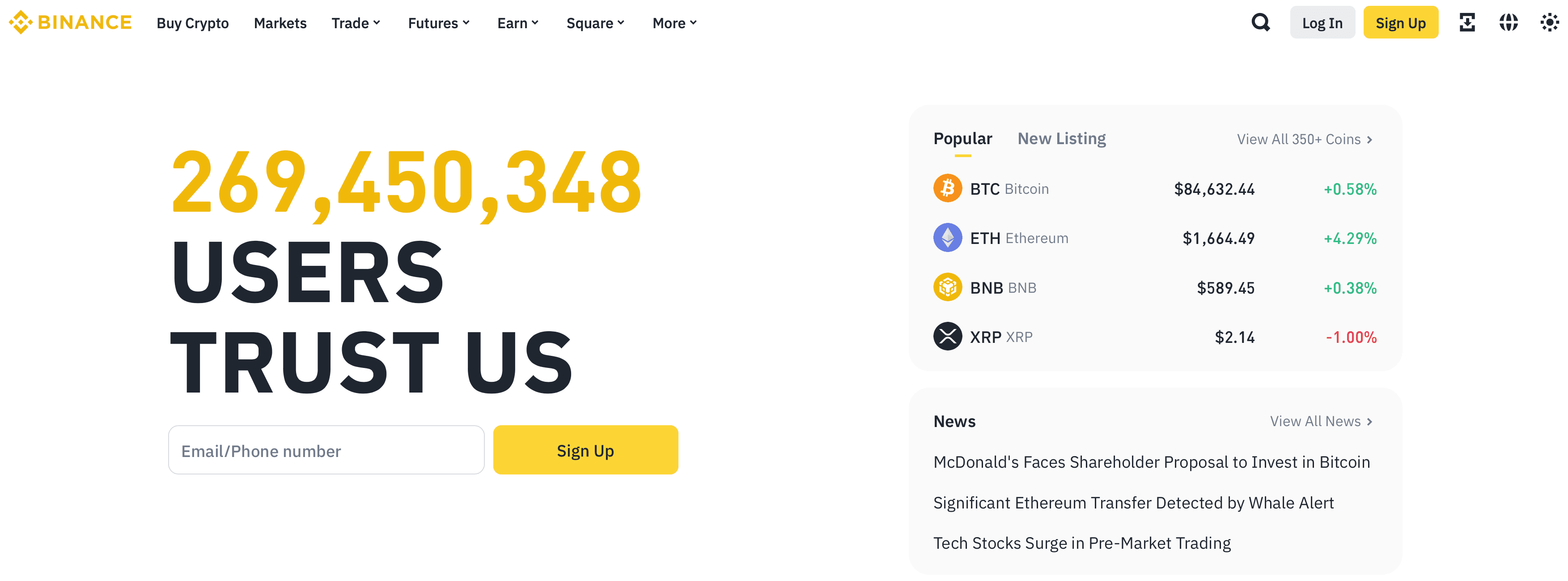 Binance Homepage. Image via Binance
Binance Homepage. Image via BinancePros
- Low trading fees, with further discounts when using BNB
- Wide selection of over 1,600 trading pairs and 350+ assets
- Advanced trading features, including spot, margin, futures, and options
- Extensive Earn suite with flexible, fixed, and high-yield staking products
- Excellent liquidity across markets
- Regulated in multiple jurisdictions, including France, Italy, and Dubai
- Integrated ecosystem: Launchpad, NFT marketplace, Binance Pay, and more
Cons
- U.S. users must access a limited version via Binance.us
- Past regulatory scrutiny has led to regional service restrictions
- KYC is mandatory for all new users
- The complex interface may overwhelm absolute beginners
- Customer support, while improved, can still lag during peak periods
Features
Binance offers an expansive suite of products for both casual and advanced users. In addition to a robust spot and futures platform, users can access yield-generating features such as Launchpool, Simple Earn, and liquidity farming. Binance Launchpad continues to be a prominent venue for early-stage token allocations, while the Binance Card enables spending crypto in supported regions. The ecosystem is further bolstered by Binance Wallet and integrations with decentralised finance protocols, supporting both CeFi and DeFi usage.
Pricing
- Spot Trading Fees: 0.1% (maker/taker), reduced to 0.075% with BNB
- Futures Fees: 0.02% maker / 0.04% taker on standard accounts
- Deposit Fees: Crypto deposits are free; fiat varies by method
- Withdrawal Fees: Vary based on asset and network
- Additional VIP tiers offer fee reductions for high-volume traders
Ideal For
Binance is ideal for intermediate to advanced traders who demand professional-grade features and the lowest fees in the industry. It’s also well-suited to yield hunters and crypto enthusiasts looking to interact with the broader ecosystem—whether that means DeFi, NFTs, or early-stage token launches. However, beginners may find the learning curve steep and should consider exploring Binance Academy before going deep.
We also have several Binance-focused articles for your reading pleasure:
- Binance NFT Review
- Binance App Review
- Binance Trading Guide
- Binance Exchange Security
- Binance Earn Review
- Binance Wallet Review
👉 Sign Up For Binance – Exclusive 20% Trading Fee Discount For Life + $600 Bonus
Bybit
Often regarded as a serious contender in the derivatives arena, Bybit has rapidly evolved from a pure futures platform into a well-rounded crypto exchange. With a sleek interface, a robust copy trading ecosystem, and an expanding product suite that includes spot trading, options, and an NFT marketplace, Bybit presents a versatile platform suitable for a wide range of trading needs.
 Bybit Homepage. Image via Bybit
Bybit Homepage. Image via BybitPros
- Up to 100x leverage on perpetual contracts
- Advanced order types and risk management tools
- Leading crypto copy trading platform with top-tier trader stats
- Offers structured products and yield-generating tools via Bybit Earn
- Zero-fee spot trading on selected pairs
- Powerful analytics tools and seamless TradingView integration
- Comprehensive mobile app and desktop trading experience
Cons
- Not available to U.S. and U.K. residents
- Limited range of fiat deposit/withdrawal methods in some regions
- A significant 2025 security breach, although reserves were quickly replenished
Features
Bybit offers a robust derivatives suite, including USDT-margined, inverse contracts, and options, all backed by lightning-fast execution. The platform shines with its copy trading functionality—ideal for users who want to follow seasoned traders without active portfolio management. Bybit also hosts an expanding Earn suite, strategic bots, dual asset investments, a crypto card, and even its own AI trading assistant, TradeGPT.
Security-wise, Bybit uses multi-signature cold wallets and offers public Proof of Reserves, although it remains a self-attested model.
Pricing
- Spot Trading Fees: 0.1% maker/taker (VIP users enjoy lower fees)
- Futures Fees: 0.01% maker / 0.06% taker
- Options Fees: 0.03% maker/taker
- Deposit Fees: Crypto deposits are free; fiat on-ramps may incur third-party fees
- Withdrawal Fees: Dynamic based on network and asset
- Zero-fee campaigns for select pairs and fiat promos are regularly offered
Ideal For
Bybit is well-suited for experienced traders, futures enthusiasts, and those who value tactical automation tools like bots and copy trading. Its clean interface also makes it accessible to intermediate users, while the strategic investment options appeal to those seeking passive yield opportunities. However, U.S. and U.K. residents will need to look elsewhere, and newer users should tread cautiously in its high-leverage environment.
Want to know about every aspect of Bybit? We've got you covered:
- Bybit Earn Review
- Bybit Products and Features
- Bybit Trading Guide
- Bybit Copy Trading Review
- Bybit Card Review
👉 Sign Up For Bybit - Up $60K In Rewards
Coinbase
If safety, simplicity, and regulatory clarity are what you seek, then Coinbase stands as one of the most reliable KuCoin alternatives in the space. As the first major cryptocurrency company to go public on the Nasdaq, Coinbase has built a reputation not just for mainstream accessibility but for setting the bar when it comes to compliance and user protection.
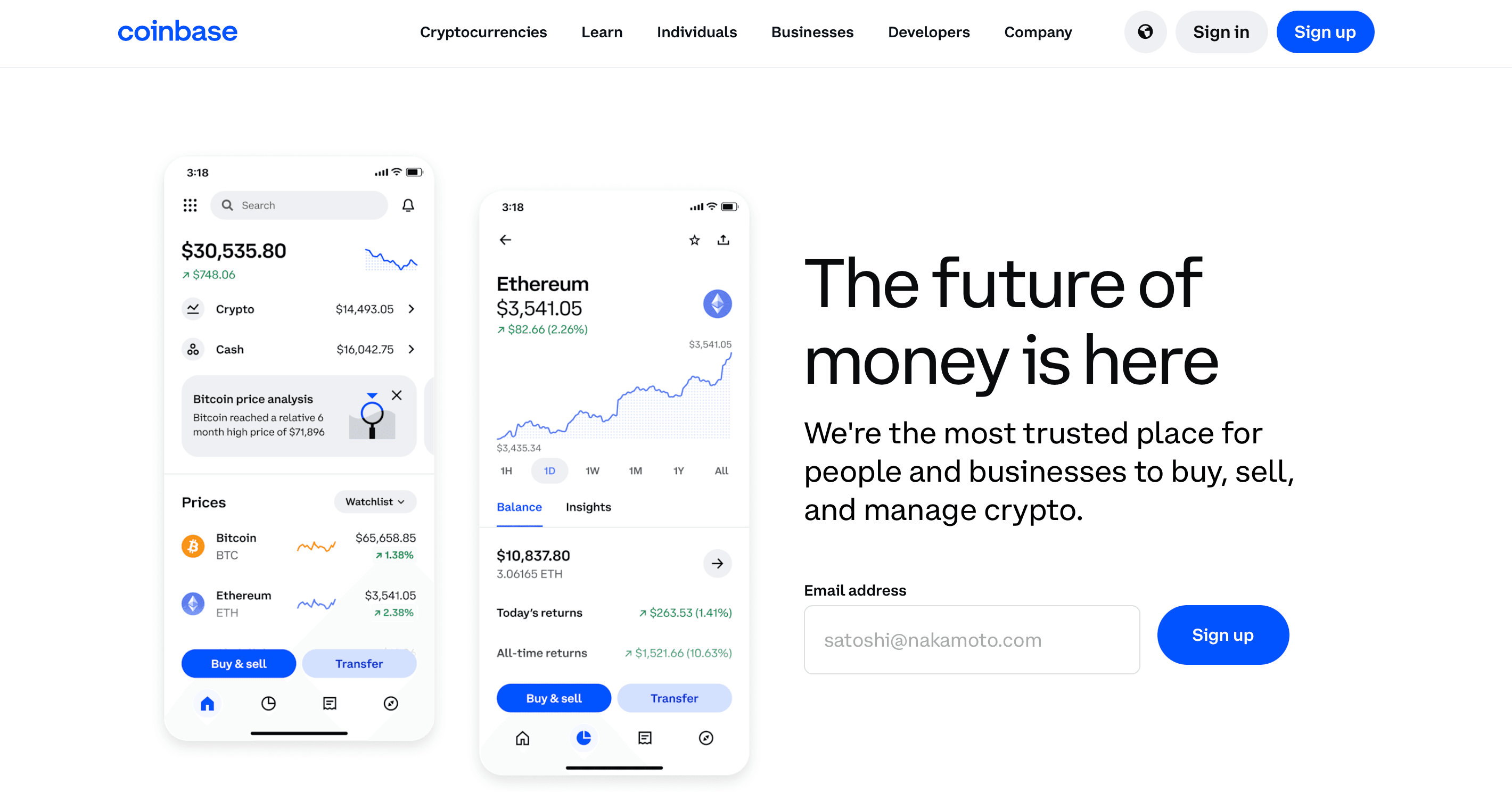 Coinbase Homepage. Image via Coinbase
Coinbase Homepage. Image via CoinbasePros
- Fully regulated and publicly listed U.S. company
- Industry-leading security measures, including 98% cold storage
- Exceptionally user-friendly interface for beginners
- Robust fiat support across USD, EUR, and GBP
- Access to a wide range of institutional-grade products (Coinbase Prime, Custody)
- Seamless transition from simple to advanced trading with Coinbase Advanced
- Offers staking, DeFi Yield, and Learn & Earn programs
- Self-custodial Coinbase Wallet with multichain support
Cons
- Higher trading fees than competitors
- Limited access in some jurisdictions outside the U.S.
- Fewer supported cryptocurrencies compared to Bitget or Binance
Features
Coinbase delivers a dual experience: an intuitive, clean interface for retail investors and a more sophisticated Coinbase Advanced terminal for charting and strategy execution. Its suite of products includes Coinbase Wallet (a self-custody wallet), Coinbase Card for spending crypto, and Base—an Ethereum Layer-2 network.
The platform also enables staking for PoS assets like ETH and ATOM, with a curated DeFi Yield interface offering a simplified gateway into otherwise complex protocols. For those interested in passive income with minimal effort, the Learn & Earn program offers a quick way to stack small amounts of crypto while brushing up on blockchain basics.
From a regulatory standpoint, Coinbase is about as compliant as they come, holding licenses across the U.S. and applying for MiCA authorization to serve the broader EU market.
Pricing
- Spot Trading Fees: Up to 0.50% for retail users; lower for high-volume Advanced traders
- Deposit Fees: Varies by region and payment method (e.g., ACH free, SEPA minimal)
- Withdrawal Fees: Region-dependent, typically low for bank transfers
- Coinbase Advanced: Tiered maker/taker fees ranging from 0.40%/0.00% to 0.60%/0.05%
- No margin or futures trading; limited to spot and passive products
Ideal For
Coinbase is tailored for beginners, casual investors, and institutions seeking regulatory peace of mind. If you're prioritizing safety, clean design, and frictionless fiat access over advanced trading features or ultra-low fees, then Coinbase is hard to beat. However, active traders, altcoin hunters, and yield farmers may find its product suite too limited for their needs.
Looking to explore more about Coinbase? You may also find the following articles helpful:
OKX
For traders seeking a seamless blend of professional-grade tools, deep liquidity, and DeFi integration, OKX offers one of the most complete trading ecosystems in the industry. This long-standing exchange has evolved far beyond its roots, now standing as a powerful alternative to KuCoin for both retail and institutional users.
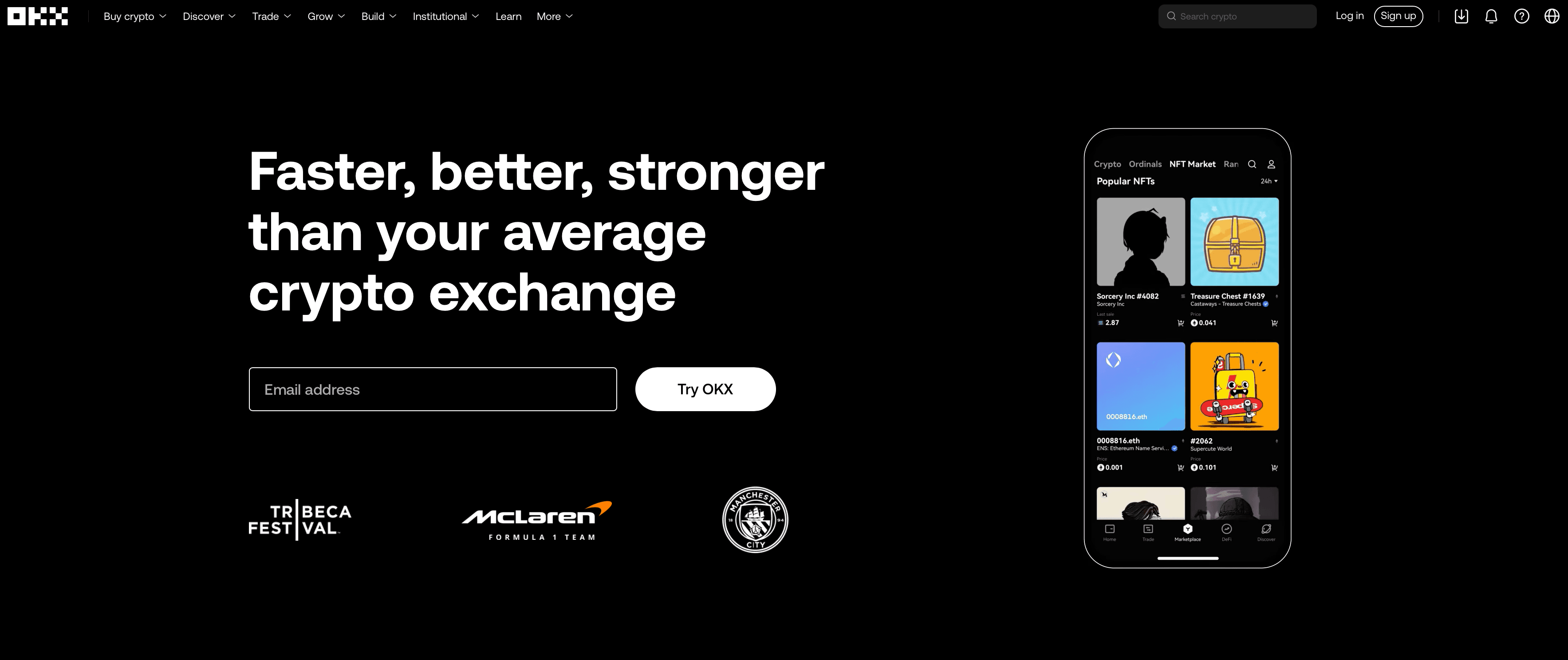 OKX Homepage. Image via OKX
OKX Homepage. Image via OKXPros
- Low trading fees rivalling the most competitive platforms
- Extensive product suite: spot, margin, perpetuals, options, staking, and launchpad
- Proof-of-Reserves is regularly updated with self-verification tools
- Integrated multi-chain self-custodial OKX Wallet
- Robust security infrastructure with a clean track record
- Earn section offers structured and on-chain products
- Advanced order types and a professional trading interface powered by TradingView
- Active developer ecosystem building on its Layer-2 network, X1
Cons
- U.S. and U.K. users are not supported
- KYC is required for full functionality
- Complex UI may overwhelm beginners
- Fiat off-ramping options still limited in some regions
Features
OKX has built out a full-stack crypto experience. From high-leverage futures and deep-liquidity options to passive income products, an NFT marketplace, and on-chain DeFi access—there’s very little it doesn’t offer.
The platform includes advanced tools like grid bots, TWAP/iceberg orders, and detailed analytics on trader sentiment and market positioning. Its Earn hub features structured products like Dual Investment and Shark Fin, while the Jumpstart launchpad offers early-stage exposure to vetted token projects.
Of particular note is the OKX Wallet—a multichain, self-custodial wallet that bridges CeFi and DeFi, supporting over 15 networks and 1,000+ DApps.
Pricing
- Spot Fees: As low as 0.08% maker / 0.10% taker (lower with OKB holdings or higher VIP tiers)
- Futures Fees: From 0.02% maker / 0.05% taker; tiered for high-volume traders
- Options Fees: Comparable to futures; capped at institutional tiers
- Deposit/Withdrawal Fees: Crypto deposits free; withdrawal fees vary by asset
- Fiat On-Ramp: Supported via third-party providers; bank transfers available in select regions
- Holding the OKB token grants reduced trading fees, access to token sales on Jumpstart, and staking bonuses within OKX Earn.
Ideal For
OKX is a standout for intermediate and advanced traders who want access to a wide range of instruments, deep markets, and on-chain integrations—all under one roof. While it may present a steep learning curve for newcomers, those looking to replace KuCoin with a more versatile and security-forward platform will find OKX an exceptional alternative.
In addition, we also have articles that dive into other aspects of the OKX Exchange:
👉 Sign Up For OKX – Exclusive 40% Spot Trading Fee Discount + Get Up To $60K In Bonuses
Bitget
Bitget has steadily emerged as a notable player in the exchange landscape, particularly in the areas of futures trading and copy trading. Launched in 2018 and headquartered in Seychelles, the platform has positioned itself as a versatile exchange for those seeking access to a range of trading tools and automation features.
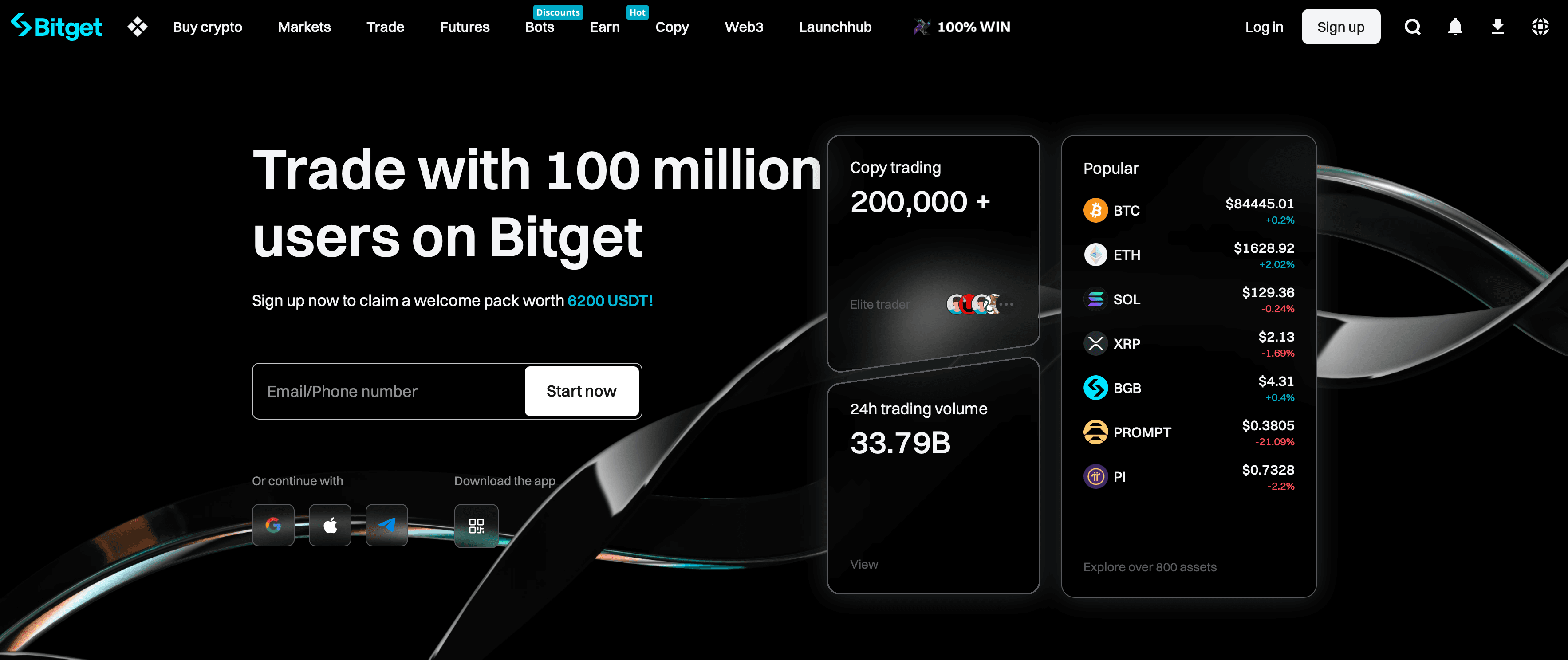 Bitget Homepage. Image via Bitget
Bitget Homepage. Image via BitgetPros
- Advanced copy trading platform with a large user base
- Up to 125x leverage on selected futures markets
- Interface customisation via TradingView integration
- Zero fees on GBP and EUR bank deposits via SEPA and FPS
- Support for over 800 cryptocurrencies across spot and futures markets
- Monthly Proof-of-Reserves snapshots with Merkle Tree verification
- Well-reviewed mobile app with broad feature support
- Strategic tools such as Quanto Swap and grid bots are available
Cons
- Earn section remains limited compared to competitors
- Limited regulatory footprint in key jurisdictions
- KYC is required to access most trading functions
- Fiat withdrawal support is restricted to a few currencies
- Grid trading tools carry inherent risks for less experienced users
Features
Bitget’s product suite caters largely to futures traders and those interested in passive investment via copy trading. The copy trading system enables users to mirror the trades of selected professionals, making it accessible for newcomers or those preferring a hands-off approach.
Strategic products such as Quanto Swap contracts offer additional flexibility for collateral use, while grid trading tools are available for those seeking automated strategies. The exchange supports over 800 assets in its spot market and includes features such as a Launchpad for early-stage token access, though its Earn section remains more limited than that of larger competitors.
Security-wise, Bitget maintains transparency through wallet disclosures and monthly Proof-of-Reserves snapshots. Although its system is self-assessed rather than independently audited, the platform maintains high SSL security scores and ranks among the top exchanges for cybersecurity according to CER.live.
Pricing
- Spot Trading Fees: 0.1% maker / 0.1% taker; reduced when paying with BGB
- Futures Fees: 0.02% maker / 0.06% taker; tiered discounts apply
- Deposits: Free for GBP, EUR, BRL via supported bank methods; crypto deposits are also free
- Card Purchases: 2–8% through third-party providers
- P2P Trading: Supported with various local payment options
- BGB, the platform’s native utility token, can be used to reduce trading fees, participate in Launchpad events, and earn yield through staking.
Ideal For
Bitget may appeal to intermediate and professional traders focused on derivatives, automation, and copy trading. Its emphasis on flexibility, trading-centric tools, and regular platform updates makes it a viable option for those prioritising execution and strategy over staking or long-term earning features.
If you're considering looking into Bitget in more detail, the following articles may offer additional useful insights:
- Bitget Copy Trading
- How to Get Started with Bitget
- Bitget Fees
- BGB Token
- Bitget Security Analysis
- How to Buy Bitcoin on Bitget
Toobit
Toobit may be one of the newer names in the centralised exchange space, but it has quietly built a respectable offering since its launch in 2022. Headquartered in the Seychelles and registered as a VASP in both Poland and Lithuania, the platform has focused on providing advanced trading tools, strong security fundamentals, and a growing suite of features aimed at both retail and professional users.
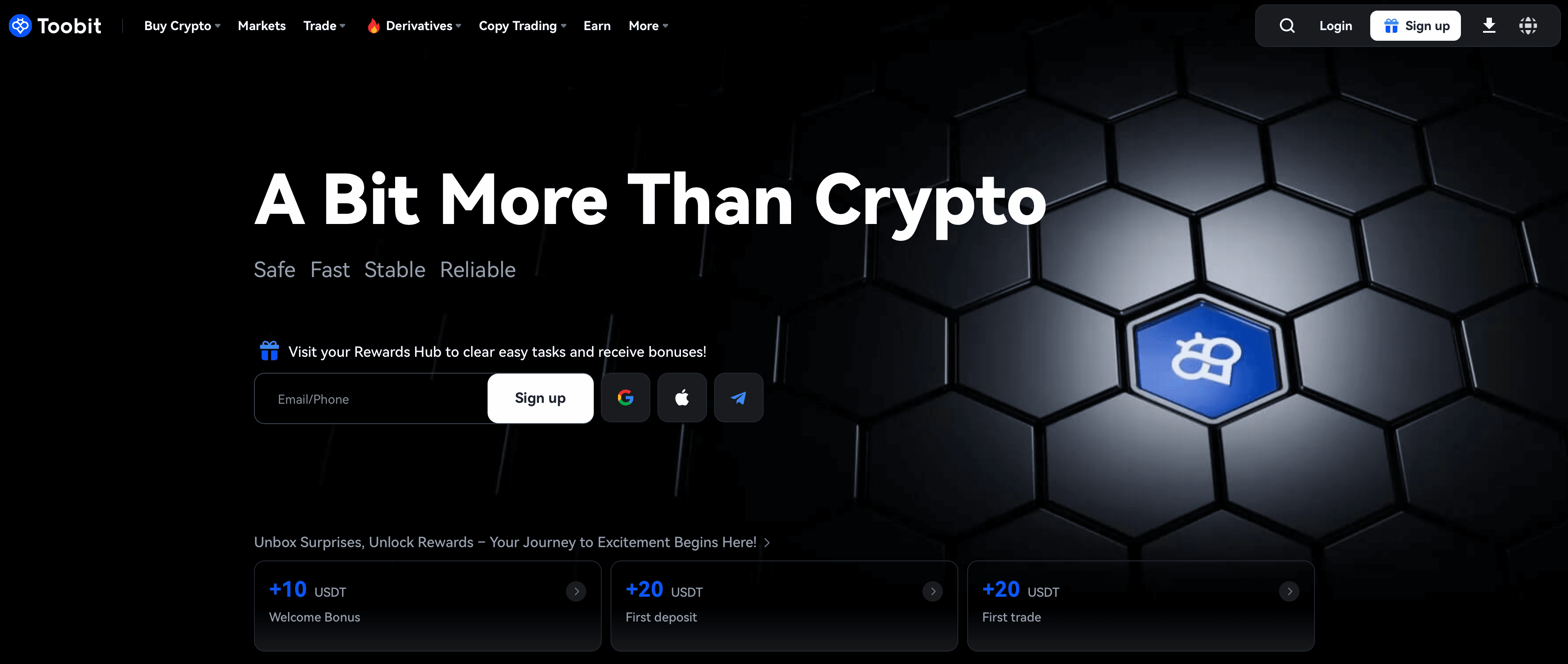 Toobit Homepage. Image via Toobit
Toobit Homepage. Image via ToobitPros
- Wide range of trading pairs: over 170 spot and 280 perpetual contracts
- Leverage up to 150x on selected futures markets
- Supports a comprehensive suite of order types, including OCO, TWAP, iceberg, and trailing stops
- Copy trading and trading bots are available
- Transparent Proof of Reserves model
- Regulated in multiple jurisdictions
- 24/7 customer support and educational resources via Toobit Academy
- Highest non-KYC trading thresholds among major platforms
Cons
- Limited fiat deposit options (primarily card-based via third-party providers)
- Earn section is currently underdeveloped compared to major competitors
- No fiat withdrawal support
- Lower brand recognition relative to more established exchanges
Features
Toobit provides a comprehensive trading environment that includes support for both spot and futures markets. The interface is streamlined and integrates TradingView charting, offering users access to professional-grade tools and a variety of advanced order types. Futures contracts are available with leverage up to 150x, depending on the trading pair.
The platform also features a copy trading system, allowing users to follow and replicate the strategies of selected traders. For those interested in automation, Toobit supports both grid and dollar-cost averaging (DCA) bots, which may appeal to users seeking a more passive trading experience.
On the security front, Toobit employs standard protocols such as two-factor authentication (2FA), AES-256 encryption, and offline cold storage for a portion of user funds. While the exchange does publish Proof of Reserves snapshots, these are self-reported and not independently verified.
Pricing
- Spot Trading: 0.2% maker / 0.2% taker (base rate)
- Futures Trading: 0.04% taker / 0.02% maker (VIP discounts apply)
- Crypto Deposits: Free
- Fiat Purchases: Variable third-party fees (typically 2–8%)
- Withdrawals: Fees vary depending on the asset and network
- Copy Trading: No upfront fees; 15% performance fee on profits shared with pro traders
- Toobit operates a tiered VIP fee structure, where trading fees reduce as volume or account balance increases. Users who sign up using a referral code can benefit from automatic upgrades to VIP Level 1.
Ideal For
Toobit may appeal to traders looking for a platform that balances futures trading functionality, copy trading access, and competitive fee structures within a simplified user interface. While it doesn’t yet offer the depth of yield products seen on larger exchanges, its trading tools and security protocols are solid. For those seeking an alternative to KuCoin with strong futures coverage and growing ecosystem support, Toobit could be a platform to consider.
👉 Sign Up For Toobit - Up To 100,000 USDT Welcome Bonus + Up To 50% Fee Discount For Life
How to Choose the Right Platform for Your Trading Style
With so many crypto exchanges now offering a growing array of services, tools, and features, choosing the right platform can feel like navigating a minefield. Yet the decision is an important one—arguably just as important as the assets you choose to trade.
 Identifying Your Trading Profile Is A Key Step In Selecting An Exchange That Aligns With Your Strategy And Goals. Image via Shutterstock
Identifying Your Trading Profile Is A Key Step In Selecting An Exchange That Aligns With Your Strategy And Goals. Image via ShutterstockUnderstand Your Trading Profile
The first step is understanding what type of trader you are. Are you just getting started, already dipping your toes in regularly, or managing large and complex portfolios?
Beginner traders tend to prioritise simplicity, security, and strong customer support. If this sounds like you, then exchanges like Coinbase or Bitget (with its streamlined copy trading tools) may offer the right level of handholding. These platforms typically feature clean interfaces, accessible fiat on-ramps, and fewer distractions.
Intermediate traders may be exploring charting tools, limit orders, or experimenting with a range of assets. You’ll likely benefit from platforms such as Bybit, Binance, or OKX, which strike a good balance between usability and advanced features. Look for exchanges that offer flexible staking, spot and futures markets, and access to a broader range of cryptocurrencies.
Professional and high-volume traders are likely to prioritise low fees, deep liquidity, execution speed, and risk management tools. OKX and Toobit offer a range of technical features, including advanced order types, API access, and leveraged products designed for seasoned operators.
Match Features to Your Strategy
Once you’ve defined your profile, the next step is aligning platform features with your personal trading strategy.
- If you’re actively trading, you’ll want low fees, high liquidity, and minimal slippage. A tiered fee model with rebates for high-volume traders, like the ones offered by Binance and OKX, may be ideal.
- If you prefer passive income, look for platforms with robust Earn programs. Exchanges like Bybit and Coinbase offer various options for staking, savings, and yield farming. But always weigh yield against risk—especially with DeFi-linked products.
- If you favour hands-off investing, then platforms with copy trading or automated bots—such as Bitget or Toobit—can help you maintain market exposure without constant involvement.
- If security is your primary concern, then regulated and transparent exchanges such as Coinbase are often considered the gold standard. Platforms that publish regular Proof of Reserves with third-party audits also earn trust in this regard.
Consider the Hidden Details
Finally, don't overlook the less visible—but equally important—details. Withdrawal fees, supported fiat currencies, mobile app quality, and customer service responsiveness can make or break your experience. Also, take note of regional restrictions and regulatory coverage, particularly if you reside in a jurisdiction with stricter compliance laws.
In short, there’s no one-size-fits-all exchange. But by evaluating your own goals, understanding the trade-offs, and aligning them with platform capabilities, you can ensure the exchange you choose complements, not complicates, your crypto journey.
Conclusion
Choosing the right cryptocurrency exchange isn’t simply about chasing the lowest fees or the flashiest features. It’s about finding a platform that aligns with your trading goals, comfort with risk, and the tools you need to succeed—whether you're placing your first buy order or managing a portfolio across multiple markets.
The key takeaway here is that diversification isn’t just for your portfolio—it can apply to the platforms you use as well. Testing a few exchanges in parallel can help you determine which ones offer the most seamless experience and best support your strategy.
Before committing capital, take the time to assess each platform’s fee structure, security track record, product offering, and ease of use. And remember—while exchanges come and go, your financial security and confidence in the tools you use should remain constant.
If you’d like to dig deeper into any of the platforms covered, be sure to explore our detailed reviews linked throughout this article.





